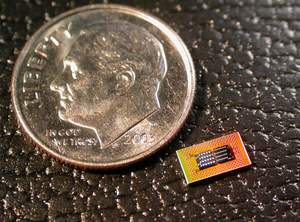IBM Research may blaze path to instant movie downloads

IBM Research says it will demonstrate a new prototype optical transceiver chipset that "is fast enough to reduce the download time for a typical high definition feature-length film to a single second compared to 30 minutes or more over the best available connectivity today."

According to IBM's statement, the goal is to transform how data is shared on networks and the Web.
"The ability to move information at blazing speeds of 160 Gigabits -- or 160 billion bits of information in a single second -- provides a glimpse of a new era of high-speed connectivity that will transform communications, computing and entertainment. Optical networking offers the potential to dramatically improve data transfer rates by speeding the flow of data using light pulses, instead of sending electrons over wires."
IBM says its chip could be integrated into circuit boards. As for details:
"To achieve this new level of integration in the chipset, IBM researchers built an optical transceiver with driver and receiver integrated circuits in current CMOS technology, the same standard, high-volume, low-cost technology used for most chips today. They then coupled it with other necessary optical components made in more exotic materials, such as indium phosphide (InP) and gallium arsenide (GaAs), into one, integrated package only 3.25 by 5.25 millimeters in size."
No word on when this chipset would go commercial. Details will emerge in a paper at the 2007 Optical Fiber Conference in Anaheim.